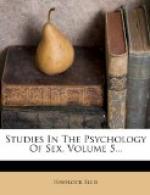Erotic symbolism is therefore concerned with all that is least generic, least specific, all that is most intimately personal and individual, in sexual selection. It is the final point in which the decreasing circle of sexual attractiveness is fixed. In the widest and most abstract form sexual selection in man is merely human, and we are attracted to that which bears most fully the marks of humanity; in a less abstract form it is sexual, and we are attracted to that which most vigorously presents the secondary sexual characteristics; still narrowing, it is the type of our own nation and people that appeals most strongly to us in matters of love; and still further concentrating we are affected by the ideal—in civilization most often the somewhat exotic ideal—of our own day, the fashion of our own city. But the individual factor still remains, and amid the infinite possibilities of erotic symbolism the individual may evolve an ideal which is often, as far as he knows and perhaps in actuality, an absolutely unique event in the history of the human soul.
Erotic symbolism works in its finer manifestations by means of the idealizing aptitudes; it is the field of sexual psychology in which that faculty of crystallization, on which Stendhal loved to dwell, achieves its most brilliant results. In the solitary passage in which we seem to see a smile on the face of the austere poet of the De Rerum Natura, Lucretius tells us how every lover, however he may be amused by the amorous extravagances of other men, is himself blinded by passion: if his mistress is black she is a fascinating brunette, if she squints she is the rival of Pallas, if too tall she is majestic, if too short she is one of the Graces, tota merum sal; if too lean it is her delicate refinement, if too fat then a Ceres, dirty and she disdains adornment, a chatterer and brilliantly vivacious, silent and it is her exquisite modesty.[66] Sixteen hundred years later Robert Burton, when describing the symptoms of love, made out a long and appalling list of the physical defects which the lover is prepared to admire.[67]
Yet we must not be too certain that the lover is wrong in this matter. We too hastily assume that the casual and hasty judgment of the world is necessarily more reliable, more conformed to what we call “truth,” than the judgment of the lover which is founded on absorbed and patient study. In some cases where there is lack of intelligence in the lover and dissimulation in the object of his love, it may be so. But even a poem or a picture will often not reveal its beauty except by the expenditure of time and study. It is foolish to expect that the secret beauty of a human person will reveal itself more easily. The lover is an artist, an artist who constructs an image, it is true, but only by patient and concentrated attention to nature; he knows the defects of his image, probably better than anyone, but he knows also that art lies, not in the avoidance of defects, but in




